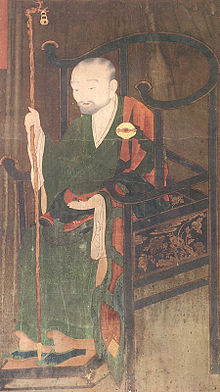Jinul
Jinul | |
|---|---|
 | |
| Title | Zen Master |
| Personal | |
| Born | 1158 |
| Died | 1210 |
| School | Seon |
| Part of a series on |
| Zen Buddhism |
|---|
 |
Chinul or Jinul (知訥; 1158–1210) was a Korean monk of the Goryeo period, who is considered to be the most influential figure in the formation of Korean Seon Buddhism.
He was born at a time when the sangha was in a state of crisis, both in terms of its external reputation as well as on internal issues of doctrine. Deeply disturbed at the degree of corruption that had crept into the sangha, Jinul sought to establish a new movement within Korean Seon which he called the "samadhi and prajna society" (Korean: 정혜사; Hanja: 定慧社; RR: Jeonghyesa). This movement's goal was to establish a new community of disciplined, pure-minded practitioners deep in the mountains. Jinul eventually accomplished this mission with the founding of the Songgwangsa monastery at Jogye Mountain.
Essence-Function (體用) is a key concept of Korean Buddhism. Essence-Function takes a particular form in the philosophy and writings of Chinul.[1]
View of Nirvana
Jinul viewed Nirvana as a sublime essence that is present in all beings. This essence is the very nature of Buddha and has always been present in beings. Writing on the faith in such matters held by his own school, Jinul states:
'Right faith in the patriarchal sect ... does not believe in conditioned causes or effects. Rather, it stresses faith that everyone is originally a Buddha, that everyone possesses the impeccable self-nature, and that the sublime essence of nirvana is complete in everyone. There is no need to search elsewhere; since time immemorial, it has been innate in everyone.'[2]
Jinul further believed that the true nature of all people is unchanging and that their minds are ultimately numinous and marked by awareness, even when seemingly in a state of delusion. In a discussion of Buddhist schools, he writes:
'In the present condensation, I treat the school of Ho-tse first, primarily so that people who are practicing meditation will be able to awaken first to the fact that, whether deluded or awakened, their own minds are numinous, aware, and never dark and their nature is unchanging.' [3]
Footnotes
- ^ Muller, Charles A. (1995). "The Key Operative Concepts in Korean Buddhist Syncretic Philosophy: Interpenetration (通達) and Essence-Function (體用) in Wŏnhyo, Chinul and Kihwa" cited in Bulletin of Toyo Gakuen University No. 3, March 1995, pp 33-48.Source: [1] (accessed: September 18, 2008)
- ^ Tracing Back the Radiance: Chinul's Korean Way of Zen by Robert E. Buswell, Kuroda Institute, University of Hawai'i Press, 1991, p. 120
- ^ Tracing Back the Radiance: Chinul's Korean Way of Zen by Robert E. Buswell, Kuroda Institute, University of Hawai'i Press, 1991, p. 152
Further reading
- Buswell Jr., Robert E.(1991). Tracing Back the Radiance: Chinul's Korean Way of Zen. University of Hawaii Press (May 1, 1991). ISBN 978-0-8248-1427-4
